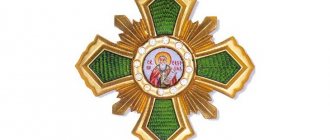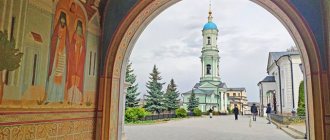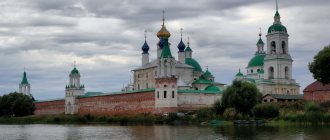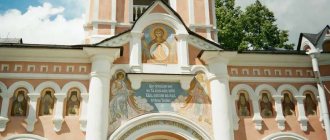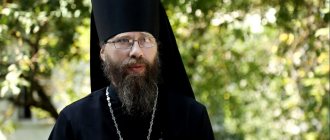Schemamonk Evfimy
I recognized Schemamonk Evfimy on my first visit to Optina Pustyn... When my friend and I, it seems, were taking pictures at the Christmas trees on the way to the source, the priest walked towards us, stopped and read a short impromptu poem: something like, you go and it is unknown under which tree the demon is hiding.
On another visit, a friend asked Father Evfimy for his blessing to enroll in graduate school at the Literary Institute, and the priest became very interested in this (we didn’t know then that he loved literature and wrote poetry himself) and began to talk with her. That summer, a friend entered graduate school, but this was not an ordinary coincidence, and her admission can only be described as a miracle.
Two years later, I approached the priest to ask for his prayers before flying to the forum of young writers. And he not only was sympathetic, but also, calling me to the monastery at a certain time, brought me a very beautiful edition of a book of his own poems as a gift. That time, by monastery standards, we chatted with the priest at the monastery for quite a long time - about literature and the need for spirituality in it. And his book was a blessing. Then the whole trip to the writers’ forum was as if I was flying on wings, and as a result of the forum I was given a large scholarship for poetry.
The son of another friend told the priest that he was going to serve in the north. Father Evfimy replied that it was cold there and took knitted woolen socks from his pocket as a gift.
Later, another friend of mine asked Father Euthymius for prayers and advice. For many years the situation with her marriage was not resolved: she was never proposed to. Father, although it was already late in the evening, talked with her for more than an hour. Soon, her friend’s companion took her to Diveevo and proposed to her there, and they got married.
Every time we came to Optina, next to Father Euthymius we saw crowds of people asking for his prayers and advice, and he devoted time to everyone, helped solve questions and, of course, suggested how to pray, handing out excerpts from the Gospel and the Psalter and other gifts...
*** Father Evfimy died suddenly on November 29, and we bought plane tickets to Moscow two weeks before and arrived on December 2 to visit Optina Pustyn for the feast of the Entry of the Virgin Mary into the Temple, but we didn’t know about the priest’s illness then. And then it was clear that we would not go to the funeral, since the third day of death would be before our arrival. I say like a naive child: “If only they had postponed the funeral to at least the fourth day, and then we might have made it in time.” Already at the airport we learned that Father Evfimy would be brought to Optina only on December 2, and would be buried there on the 3rd, on the 5th day. That is, a miracle happened, as if he had been waiting for us. And we were able to escort him into the Kingdom of Heaven, attending the funeral service and funeral.
...In that conversation at the monastery, I asked Father Euthymius: “How long ago did you become such a believer, how long ago did you become a church member?” And he replied: “I’m still a baby...”
The priest will have 40 days for the holiday of Christmas, when the Infant of God was born into the world...
Rest schemamonk Euthymius, O Lord, with Your saints and create eternal memory for him!
If you haven't been to Optina Pustyn, be sure to check it out!
St. Vladimir's Cathedral. Optina Pustyn.
Notes of a pilgrim.
Early on an early March morning, we pilgrims of the North Sea diocese entered the holy Gates of the monastery of the Vvedensky stauropegial monastery. Here they were saved, and thousands and thousands of other souls were saved, by 14 great elders, the venerable fathers of Optina, 12 of whom their relics are in the monastery, and two venerables were buried unknown in the places of their last martyrdom, during the time of Soviet persecution. This is Rev. Nikon - confessor and martyr Isaac. E.N. The villager writes about Optina: “Three miles from Kozelsk, on the right, forested bank of the not wide, but deep and raftable river Zhizdra, on a semi-mountain from which a dense pine forest begins and Optina Pustyn is located.”
Belfry of murdered monks.
The origins of Optina remain unknown. Presumably, it was built by the ascetics themselves, by calling from above, with tears of repentance, labor and prayer.
When the Romanov dynasty reigned in Rus', land was donated to the monastery. Under Peter I, the hermitage was abolished, but 2 years later, upon request, it was reopened. This was a period of impoverishment, which continued during the reign of Catherine II. By the end of the 18th century, communal life was restored by Metropolitan Platon of Moscow.
Source of Sergius of Radonezh near the Zhizdra River
The spiritual revival of Optina began only 30 years later, when Bishop Philaret of Kaluga decided to establish a monastery. The monastery comes to life again, reborn in the gift of a gracious eldership.
The spiritual flowering of Optina is associated with the names of its great elders: Saints Leo, Macarius, Moses, Anthony, Ambrose and their followers. The eldership was strengthened thanks to the activities of Rev. Macarius, continued to flourish under St. Ambrose and subsequent great successors. The Brotherhood of the Monastery had a wide sanctifying influence on its people.
And to this day, the spirit of the peace of Christ, acquired through the holy elders, is felt by all visitors to the monastery. This atmosphere of concentration and silence also captured us pilgrims.
Klykovo. Monastery of the Savior Not Made by Hands. Church of the Transfiguration of the Lord
Before the revolution, there were about 300 monks in Optina. At that time, Western European culture began to penetrate into Russia, and there were more and more people who did not understand our true Orthodoxy, preserved by the Church. The October Revolution of 1917 showed the fall of the human soul, cut off from God. The monastery was closed, the monks were expelled, many were arrested, exiled and died in camps. The monastery was ruined, plundered and desecrated.
By the providence of God, in the year of the millennium of the Baptism of Rus' in 1987, Optina Pustyn was returned to the Russian Orthodox Church. Now there are about 180 monks in Optina.
Optina. Source Rev. Paphnutius Borovsky
The monastery is impressive with its size, architecture and spiritual atmosphere. In plan, the monastery has a square shape. In its center is the main temple - the Vvedensky Cathedral, and around it there are churches arranged crosswise: the Kazan and Vladimir Icons of the Mother of God and St. Mary of Egypt. The Vvedensky Cathedral was the very first to be restored after the destruction. During the day, the main churches of the monastery: Vvedensky, Kazan and Vladimir are always open. Everyone is blessed with free entry and access to shrines: revered icons and St. relics of the Reverend Fathers and Elders of Optina. Behind the grove of the monastery there is a monastery in which the monks live.
Optina. Monk Euthymius surrounded by pilgrims
With the beginning of the restoration of the monastery, the birds that had left it during the years of devastation returned to the grove. On Easter 1993, three of its inhabitants were killed in Optina Pustyn: hieromonk Vasily (Roslyakov), monks Trofim (Tatarnikov) and Ferapont (Pushkarev). The monks Ferapont and Trofim rang the bell tower, announcing Easter joy. They were killed first. Hieromonk Vasily went to the skete to confess the prayers, but at the skete gates, rushing to help his brothers, he was overtaken by a murderer.
Pafnutiev Borovsky Monastery
In 2004, Nina Pavlova’s book “Red Easter” was published, about three Optina monks killed on Easter. This is a chronicle of events compiled on the basis of memories of the new martyrs and manuscripts left from them.
A chapel was built over the burial place of the murdered monks in honor of the Resurrection of Christ. The Optina monks have not yet been officially glorified, but among Christians they are revered as saints. They are loved, they pray to them, and they receive help.
Tikhonova Pustyn. Monastery History Museum
During the 5 days spent in Optina, our pilgrims attended divine services: Divine liturgies, prayer services, memorial services in the chapel, akathists to especially revered saints and icons. We took a dip in the monastery healing spring of St. Paphnutius Borovsky. And, of course, we worked hard cleaning the churches and chapel.
And the most persistent ones managed to go to the meeting between the abbot of the monastery, Archimandrite Benedict, and the Optina pilgrims.
We visited Shamordino, visited Klykovo, Tikhonova Hermitage. In the Pafnutiev-Borovs monastery, founded in the 14th century, we stayed overnight and attended the early Liturgy.
Chapel of the Resurrection of Christ (the murdered monks of Optina)
An eventful trip, rich in impressions, with a feeling of the gracious joy of the holy place, will forever remain in the memory and invisible prayer connection with the venerable elders. In Optina, we met a monk talking with people, this is Schemamonk Evfimy, he is already well over 70 years old, and he writes spiritual poetry. They are very simple and sincere. Hieromonk Anthony gave me several of these poems after confession and said: “Share with others.” I share one of them with you:
Today GOD appeared early in the morning... He accepted complaints and requests...
And without deception he poured what he wanted into people’s hearts from a jug.
But not everyone had an open heart, and not everyone had room for a miracle.
Either the door is closed by envy or enmity, or greed does not allow success to flow... And for some, sadness and hopelessness are spilled to the brim, that’s the problem.
and GOD regretted that the heart was so covered, he wanted to pour love, but where?
and GOD was sad that people do not know how to cleanse their hearts and souls of grievances.
Over the years, they harden in the heart and the heart turns into granite. and GOD walked, looked and smiled when He met love for others in their hearts.
When He saw sacrifice and unity, He took a jug and carefully poured happiness into them from the heart...
And people gradually splashed out the grace given by GOD
And they blamed everyone around for the loss, forgetting to look for the blame in themselves. After all, if we could forgive and believe, love to thank and let go,
then GOD could measure happiness by not a drop - the wonderful jug could give it all away!
Today GOD appeared at dawn. A huge box with requests at your feet...
And next to it there is only one envelope without asking: “Thank you for everything, my GOD...”
We returned from a seven-day pilgrimage, just before the beginning of Lent, to our parish churches, so that with church prayer, forgiveness and repentance, we could begin the work of saving our souls, during the grace-filled time of fasting assigned to us by the Church.
At the Gates of the Holy Monastery of Optina
Anisimova E.A.
Views (5328)
Share:
- Share on Twitter (Opens in new window)
- Send link on VKontakte (Opens in new window)
- Send link to Odnoklassniki (Opens in new window)
- Click to share on Facebook (Opens in new window)
- Click to print (Opens in new window)
Children's prayers
When Vita turned 6, dad was taken to the front - it was 1941. Every evening, all the children in the family prayed on their knees in front of the icons, asking the Lord for the protection of their father and other Russian soldiers. In Andreevka in those years there were 68 courtyards, and almost all the inhabitants of these courtyards were believers, they kept icons in the red corners, they prayed every day and consecrated the icons for the feasts of saints. In the five-walled house of the Bogomolovs there were three red corners with icons and lamps. On holidays and when necessary, the grandmother anointed her grandchildren with oil from lamps. Father Evfimy later recalled that there were no icons in six huts, and the owners of five of them did not return home from the war.
Optina Pustyn, history of foundation
In the old days, a desert was the name given to the habitat of a small male monastic community. According to legend (no written evidence has been found), at the end of the 14th century the desert was founded by a robber named Opta. He repented of his bad deeds, took monastic vows under the name Macarius and became the first abbot of this small monastery. For a long time, the monastery eked out a miserable existence, survived the Time of Troubles after the death of Tsar Boris Godunov, devastation during the Polish-Lithuanian invasion, but still survived. In 1724, there were only 12 monks in the monastery, and Makaryevskaya Optina Pustyn was abolished. However, already in 1726 it was restored, all the monastery property was returned to it, but for a very long time the number of monks was insignificant: in 1770 there were 3 monks, in 1772 - two monks, both in very advanced years. The fate of Optina Pustyn changed dramatically in 1796, when Metropolitan Platon of Moscow and Kaluga visited it. He was fascinated by the location of the ancient monastery. On the banks of the Zhizdra River, next to a pine forest, this place seemed to be specially created for hermit life, for spiritual quests. The monastery began to be rebuilt, cathedrals and churches, chapels, a hospital, a three-tier bell tower with attached monastic cells appeared. They built a monastery for hermits who voluntarily doomed themselves to a life of solitude, reflecting on faith and the destiny of man. Gradually, Optina Pustyn turned into an island of spirituality, where thousands of people came to gain wisdom, receive advice, and help (they say that the elders of Optina Pustyn have healing powers).
And the New Heaven and the New Earth
Schemamonk Evfimy.
In the photo there is also monk Elisha. On November 29, 2022, Schemamonk Evfimy departed to the Lord. The head of the Optina hermitage, Abbot Tikhon (Borisov), dedicated his poems to Father Euthymius: A bright spark of life burned out. Everything was given to the people, down to the smallest grain. And the angel quickly raises the soul through the winter shutters of the open window. There, where the vineyard is full of miracles, Where the elders of Optina walk in it, And the silent contemplation holiday, And the Lamb's Meal is filled with fire. From the heights, distribute to all of us a brush - Your love and youthful eyes. You were a tree, we are dried leaves, But the Gardener is waiting for Him and us. We believe - you will return in your memory, Like a white sail, like your favorite light, And, smiling, you will turn around With handfuls of mysterious sweets. The sun-worn schema trembles, The Champs Elysees nod to others. Together with the cherub, both the New Heaven and the New Earth are waiting for you...
Olga Rozhneva
If you don’t want to study, go work on a collective farm
In those years, children began working on the collective farm early. Since elementary school, Vitya has tended a herd of collective farm sheep and goats in the summer. After the 4th grade, he had to work as a shepherd almost until the end of October, and when he returned to school, it turned out that the first quarter had already ended, and he was far behind his classmates. One evening, after a family dinner, the class teacher came to the Bogomolovs and began to complain that although the boy was capable, it was difficult for him to catch up with the class, he needed to study extra, try harder. Dad listened calmly, and then asked his son: “Son, do you want to study?” Here you are, sitting in the corner under the icons, almost an adult... Decide for yourself! If you don’t want to study, go work on a collective farm. You’ll go to the farm to carry feed and firewood... Vitya stood up, looked at his father’s calm face and answered: “Okay, dad, bless me.” Mom, who had been silent until then, became alarmed and, excitedly crossing herself at the icon, began to wail: “Oh, why are you deciding so unreasonably!” The class teacher, who did not expect such a turn of events, also became alarmed and began to object that the boy was still small and needed to go to school. Vitya struck a pose and answered: “I’ll be 13 years old in January - how small am I?!” This is how Vitya began his working career at the age of 12. But dad knew that studying required desire, and, apparently, he was sure that this desire would come to his son, just a little later. Looking ahead, let's say that this is what happened.
Without God - not to the threshold
The future schema-monk, and then simply Vitya Bogomolov, was born in 1935 in the village of Andreevka, Ordynsky district, Perm region. In those days, the village, founded in 1782, was still living a full life - but now there are very few inhabitants left in it. The Bogomolov family had many children: 8 children. Mom worked on a collective farm as a cowgirl: she milked cows, grazed them, and cleaned manure. There was a lot of work, and the grandmother helped manage the children; the children called her “old mother.” The old mother prayed in the morning, and read prayers from memory until she was very old, and then got up to the stove and prepared dinner for the whole herd, as well as food for the cow, goats and sheep. I woke up my grandchildren for breakfast and prayed with them again - the children were accustomed to prayer. Vitya could not imagine how one could sit down at the table or go to bed without prayer. In the evening they prayed with a kerosene lamp, and when there was no kerosene, with a burning torch. However, the torch was not burned for a long time, because the grandmother still knew all the prayers by heart.
Help from Blessed Kiryan Penkovsky
In 1948, 13-year-old Vitya worked as a trailer operator in a tractor brigade. They worked in pairs: tractor driver and trailer driver. After the war there were not enough men, and a 20-year-old girl, Nadya, worked together with Vitya. They plowed the ground before sowing around the clock, with a short break for technical maintenance of the tractor, and the links were changed at the mill or right in the field. Once Nadya and Vitya were plowing a field at night near the Kirkina birch tree, named after the blessed Kiryan Penkovsky. Suddenly, already close to dawn, the tractor sharply tilted on its side and skidded. It turned out to be an old crater dating back to the Civil War. Nadya shouts: “Vityenka, we need some kind of log!” He ran to the nearest forest and brought two logs. Nadya skillfully inserted them into the spurs of the tractor and asks her partner: “Vitya, pray!” -Who should I pray to? -What kind of tree is this? - The blessed birch picks... - So ask for his prayerful help and intercession before the Lord! - Blessed Kiryan Penkovsky, pray to the Lord for us to help us get out of the pit! And then we left! We finished our shift in the morning, after working all night, we returned to the field camp. Nadya told the foreman how they had stalled, how they left with the blessed prayer. Brigadier Stepan Ivanovich praised Vitya, gave him a second piece of collective farm bread with milk and sent him to sleep until the next shift. Then he looks: the boy fell asleep right at the table from fatigue. He was small in stature and light in weight, and Stepan Ivanovich took him in his arms and carried him to the field carriage, in the corner of which there was an icon of the Most Holy Theotokos. Vitya will wake up - the tender gaze of the Mother of God will meet him, he will fall asleep again, and then he slept so sweetly! And the collective farmers, even though they were Soviet people, the majority still believed in God and kept icons in their houses. During the war and after, faith only became stronger. There was even an icon in the field carriage. Maybe they cleaned it up when the bosses arrived, but it’s unlikely that the bosses looked into the field cars...
How Victor liked studying
When Victor turned 15, he was sent according to the order to the FZU - Factory School, to learn how to sew shoes (then shoes were in short supply). He studied, worked, then served 3 years in the army and was demobilized with the rank of senior sergeant. After the army, he worked in a mine for 5 years, and also graduated from a school for working youth and received a secondary education. He liked studying so much that he entered the Agricultural Institute to become an agronomist, and then to graduate school. He defended his PhD thesis, became a senior, then a leading researcher, head of a laboratory, and deputy director for scientific work. Based on the results of his research, he published 250 scientific articles and received 2 silver medals from VDNKh.


